Food for thoughts
Thesaurus : Doctrine
Référence complète : Lalande, P.-A., Le pouvoir d’injonction au service de la réparation du préjudice écologique : une mise en œuvre de l’office du juge administratif en matière climatique, Actu-Juridique, 9 décembre 2021.
____
_____
Thesaurus : Doctrine
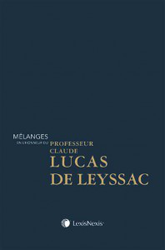
► Référence complète : P.-Y. Gautier, « Contre le droit illimité à la preuve devant les autorités administratives indépendantes », Mélanges en l'honneur du Professeur Claude Lucas de Leyssac, LexisNexis, 2018, p.181-193.
____
📘 Lire une présentation générale de l'ouvrage dans lequel l'article est publié
Thesaurus
Référence complète : Grandjean, J.P., rapporteur, Rapport sur l'avocat chargé d'une enquête interne, Conseil de l'Ordre des Avocats, Paris, 8 mars 2016.
Thesaurus : Doctrine

► Full Reference: O. Douvreleur, "Compliance and Judge ruling only on points of Law", in M.-A. Frison-Roche (ed.), Compliance Jurisdictionalisation, series "Compliance & Regulation", Journal of Regulation & Compliance (JoRC) and Bruylant, to be published.
___
► Article Summary (done by the Journal of Regulation): Compliance maintains with the judge complex relations, and even more with the judge ruling only on points of Law (in France, the Court de Cassation in the judicial order, the one who, in principle, does not know the facts that he leaves to the sovereign appreciation of the judges ruling on the substance of the disputes. At first glance, compliance is a technique internalised in companies and the place occupied by negotiated justice techniques leave little room for intervention by the judge ruling only on points of Law
However, his role is intended to develop, in particular with regard to the duty of vigilance or in the articulation between the different branches of Law when compliance meets Labor Law, or even in the adjustment between American Law and the other legal systems, especially French legal system. The way in which the principle of Proportionality will take place in Compliance Law is also a major issue for the judge ruling only on points of Law.
____
________
Compliance and Regulation Law bilingual Dictionnary

The procedural guarantees from which the person benefits are mainly the right of action, the rights of defense and the benefit of the adversarial principle.
While the rights of the defense are subjective rights which are advantages given to the person at risk of having his situation affected by the decision that the body which is formally or functionally legally qualified as a "tribunal", may take, the adversarial principle is rather a principle of organization of the procedure, from which the person can benefit.
This principle, as the term indicates, is - as are the rights of the defense - of such a nature as to generate all the technical mechanisms which serve it, including in the silence of the texts, imply a broad interpretation of these.
The adversarial principle implies that the debate between all the arguments, in particular all the possible interpretations, is possible. It is exceptionally and justified, for example because of urgency or a justified requirement of secrecy (professional secrecy, secrecy of private life, industrial secrecy, defense secrecy, etc.) that the adversarial mechanism is ruled out. , sometimes only for a time (technique of deferred litigation by the admission of the procedure on request).
This participation in the debate must be fully possible for the debater, in particular access to the file, knowledge of the existence of the instance, the intelligibility of the terms of the debate, not only the facts, but also the language (translator, lawyer , intelligibility of the subject), but still discussion on the applicable legal rules). So when the court automatically comes under the rules of Law, it must submit them to adversarial debate before possibly applying them.
The application of the adversarial principle often crosses the rights of the defense, but in that it is linked to the notion of debate, it develops all the more as the procedure is of the adversarial type.
Thesaurus : Doctrine
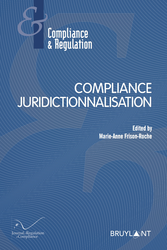
► Full Reference: F. Raynaud, "The administrative judge and compliance", in M.-A. Frison-Roche (ed.), Compliance Jurisdictionalisation, coll. "Compliance & Regulation", Journal of Regulation & Compliance (JoRC) and Bruylant, 2023, p.
____
📘read a general presentation of the book, Compliance Jurisdictionalisation, in which this article is published
____
► Summary of the article:
________
Compliance and Regulation Law bilingual Dictionnary
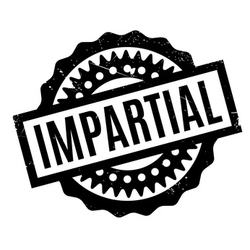
It can not be defined as the absolute positive aptitude, namely the total absence of prejudice, the heroic aptitude for a person to totally ignore his or her personal opinions and personal history. This heroic virtue is nonsense because not only is it inaccurate, impossible but it is also not desirable because a person is not a machine. It must not be so because good justice is human justice. In this respect, impartiality refers to a philosophical conception of what is justice and what is Regulation, not machines, but systems that must keep the human person in their center (Sunstein).
Thus Impartiality is articulated with the subjective nature of the assessment not only inevitable but also desirable that the judge makes of situations. Because Law is reasonable, Impartiality is defined only negatively: the absence of bias.
Impartiality is defined first and foremost as a subjective and individual quality, namely, the prohibition on the person who makes a decision affecting the situation of others (as is the case of a judge) to a a personal interest in this situation. The constitutional prohibition of being "judge and party" is thus the expression of the principle of impartiality. This definition is in line with the otherwise general requirement of no conflict of interests.
Impartiality is defined secondly as an objective and individual quality, namely the prohibition for a person who has already known of the case to know again (because he or she has already had an opinion about it, this having constituted an objective pre-judgment).
Impartiality is defined thirdly as an objective and structural quality, which obliges the organ which takes judgments to "give to see" a structure that makes it fit for this impartiality, objective impartiality that third parties can see and which generates confidence in its ability to judge without bias. This theory of English origin has been taken up by European law in the interpretation given to the European Convention on Human Rights. The expression "apparent impartiality" has sometimes given rise to misunderstandings. Indeed, far from being less demanding (in that it is "only" to be satisfied with an appearance of impartiality and not of a true impartiality), it is rather a matter of demanding more, not only of a true impartiality, but also of an impartiality which can be seen by all. This leads in particular to the obligation of transparency, to which the institutions, notably the State, were not necessarily bound by the law.
For a long time the Regulator, in that it took the form of an Administrative Authority, was not considered a jurisdiction, it was long considered that it was not directly subject to this requirement. It is clear from the case law that the national courts now consider that the regulatory authorities are courts "in the European sense", which implies a fundamental procedural guarantee for the operators concerned
Compliance and Regulation Law bilingual Dictionnary

The procedural guarantees enjoyed by a person whose situation may be affected by a forthcoming judgment are mainly the right of action, the rights of defense and the benefit of the adversarial principle.
The rights of the defense have constitutional value and constitute human rights, benefiting everyone, including legal persons. The mission of positive Law is to give effect to them in good time, that is to say from the moment of the investigation or custody, which is manifested for example by the right to the assistance of a lawyer or the right to remain silent or the right to lie. Thus the rights of the defense are not intended to help the manifestation of the truth, do not help the judge or the effectiveness of repression - which is what the principle of adversarial law does - they are pure rights, subjective for the benefit of people, including even especially people who may be perfectly guilty, and seriously guilty.
The rights of the defense are therefore an anthology of prerogatives which are offered to the person implicated or likely to be or likely to be affected. It does not matter if it possibly affects the efficiency. These are human rights. This is why their most natural holder is the person prosecuted in criminal proceedings or facing a system of repression. This is why the triggering of the power of a tribunal or a judge offers them in a consubstantial way to the one who is by this sole fact - and legitimately - threatened by this legitimate violence (one of the definitions of the State ).
The rights of the defense therefore begin even before the trial because the "useful time" begins from the investigation phase, from the searches, even from the controls, and continues on the occasion of appeals against the decision adversely affecting the decision. The legal action being a means of being a party, that is to say of making arguments in its favor, and therefore of defending its case, shows that the plaintiff in the proceedings also holds legal defense rights since he is not only plaintiff in the proceedings but he also plaintiff and defendant to the allegations which are exchanged during the procedure: he alleged to the allegation of his opponent is not correct.
They take many forms and do not need to be expressly provided for in texts, since they are principled and constitutionally benefit from a broad interpretation (ad favorem interpretation). This is the right to be a party (for example the right of intervention, the right of action - which some distinguish from the rights of the defense - the right to be questioned, such as the right to be brought into question (or examination), right to be assisted by a lawyer, right to remain silent, right not to incriminate oneself, right of access to the file, right to intervene in the debate (the rights of the defense thus crossing the adversarial principle), right to appeal, etc.
It is essential to qualify an organ as a tribunal because this triggers for the benefit of the person concerned the procedural guarantees, including the rights of the defense, which on the basis of Article 6 of the European Convention on Human Rights man was made about the Regulators yet formally organized in Independent Administrative Authorities (AAI). This contributed to the general movement of jurisdictionalization of Regulation.
Compliance and Regulation Law bilingual Dictionnary

Legally, the State is a public law subject defined by territory, people and institutions. It acts in the international space and emits norms. Politically, it has the legitimacy required to express the will of the social body and to exercise the violence of which it deprives the other subjects of law. It is often recognizable by its power: its use of public force, its budgetary power, its jurisdictional power. These three powers, declining or being challenged by private, international and more satisfying mechanisms, some predicted the disappearance of the State, to deplore it or to dance on its corpse.
With such a background, in current theories of Regulation, primarily constructed by economic thought and at first sight one might say that the State is above all the enemy. And this for two main reasons. The first is theoretical and of a negative nature. The advocates of the theory of regulation deny the State the political qualities set out above. The State would not be a "person" but rather a group of individuals, civil servants, elected officials and other concrete human beings, expressing nothing but their particular interests, coming into conflict with other interests, and using their powers to serve the former rather than the latter as everyone else. The Regulation theory, adjoining the theory of the agency, is then aimed at controlling public agents and elected representatives in whom there is no reason to trust a priori.
The second reason is practical and positive. The State would not be a "person" but an organization. Here we find the same perspective as for the concept of enterprise, which classical lawyers conceive as a person or a group of people, while economists who conceive of the world through the market represent it as an organization. The state as an organization should be "efficient" or even "optimal". It is then the pragmatic function of the Regulation Law. When it is governed by traditional law, entangled by that it would be an almost religious illusions of the general interest, or even the social contract, it is suboptimal. The Regulation purpose is about making it more effective.
To this end, as an organization, the State is divided into independent regulatory agencies or independent administrative authorities that manage the subjects as close as possible, which is fortunate in reducing the asymmetry of information and in reviving trust in a direct link. The unitary, distant and arrogant State is abandoned for a flexible and pragmatic conception of a strategic state (without capital ...) that would finally have understood that it is an organization like any other ...
Competition law adopts this conception of the State, which it posed from the beginning that it was an economic operator like any other. This is how this conception which would be more "neutral" of the world is often presented.
Successive crises, whether sanitary or financial, have produced a pendulum effect.
Now, the notions of general interest or common goods are credited of an autonomous value, and the necessity of surpassing immediate interests and of finding persons to bear superior interests or to take charge of the interests of others, even a non-immediate one, emerged.
Thus, the State or the public authority, reappears in the globalization. The Compliance Law or the Corporal Social Responsibility of the crucial companies are converging towards a consideration of the State, which can not be reduced to a pure and simple organization receptacle of externalities.
Thesaurus : Doctrine
► Référence complète : A.-M. Ilcheva, "Condamnation de Shell aux Pays-Bas : la responsabilité climatique des entreprises pétrolières se dessine", D. 2021, pp. 1968-1970
____
► Résumé de l'article : Après une brève description de l'affaire en cause au principal, l'auteure explicite dans un premier les fondements du jugement dit "Shell". Elle explique que l'action engagée était fondée sur le droit de la responsabilité civile délictuelle néerlandais, plus précisément le "duty of care" de l'article 6:162 du code civil néerlandais, lequel amène le juge, afin d'établir le fait générateur, à apprécier le comportement de l'entreprise défenderesse au regard du standard de comportement de la personne prudente et raisonnable. Sont également mobilisés par le juge des travaux scientifiques (rapport du GIEC), des normes de droit international (CEDH) et des normes de droit souple (Principes directeurs de l'ONU), afin de caractériser tant le fait générateur que le dommage (notamment futur). Dans un second temps, l'auteure envisage la portée de ce jugement, frappé d'appel au moment de la rédaction de son article. Elle souligne que le juge s'est appuyé sur la notion d'entreprise, permettant ainsi de contourner l'obstacle traditionnel lié à la personnalité morale, et qu'il a retenu ici une responsabilité préventive, tournée vers le futur. Elle termine en mettant en avant les conditions nécessaires pour que ce jugement soit effectif et constate que l'effort demandé à l'entreprise est plus important que celui préconisé par les rapports d'experts.
____
🦉Cet article est accessible en texte intégral pour les personnes inscrites aux enseignements de la Professeure Marie-Anne Frison-Roche
________
Thesaurus : Doctrine

► Full Reference: B. Sillaman, "Taking the Compliance U.S. Procedural Experience globally", in M.-A. Frison-Roche (ed.), Compliance Jurisdictionalisation, Journal of Regulation & Compliance (JoRC) and Bruylant, coll. "Compliance & Regulation", to be published.
____
📘read a general presentation of the book, Compliance Jurisdictionalisation, in which this article is published
____
► Summary of the article (done by the Journal of Regulation & Compliance): The French legal system is evolving, organizing interaction between lawyers with regulators and prosecutors, specially in investigations about corruption or corporate misconduct, adopting U.S. negotiated resolutions such as the Convention judiciaire d'intérêt public, which encourages "collaboration" between them.
The author describes the evolution of the U.S. DOJ doctrine and askes French to be inspired by the U.S. procedural experience, U.S. where this mechanism came from. Indeed, the DOJ released memoranda about what the "collaboration" means. At the end (2006 Memorandum), the DOJ has considered that the legal privilege must remain intact when the information is not only factual in order to maintain trust between prosecutors, regulators and lawyers.
French authorities do not follow this way. The author regrets it and thinks they should adopt the same reasoning as the American authority on the secret professionnel of the avocat, especially when he intervenes in the company internal investigation.
____
🦉This article is available in full text to those registered for Professor Marie-Anne Frison-Roche's courses
________
Compliance and Regulation Law bilingual Dictionnary
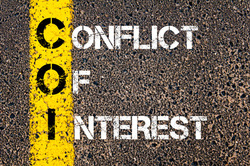
Paradoxically, the notion of conflict of interest seems to be at the center of Economic Law only recently in Economic Law, in both Corporate and Public Law. This is due to the philosophy which animates these two branches of Law, very different for each, and which has changed in each.
In fact, and in the first place in Public Law, in the Continental legal systems and especially in French legal tradition, on the side of the State, the one who serves it, by a sort of natural effect,, makes the general interest incarnated by the State pass before its personal interest. There is an opposition of interests, namely the personal interest of this public official who would like to work less and earn more, and the common interest of the population, who would like to pay less taxes and for example benefit trains that always arrive on time and the general interest which would be for example the construction of a European rail network.
But this conflict would be resolved "naturally" because the public official, having "a sense of the general interest" and being animated by the "sense of public service", sacrifices himself to serve the general interes. He stays late at his office and gets the trains on time. This theory of public service was the inheritance of royalty, a system in which the King is at the service of the People, like the aristocracy is in the "service of the King." There could therefore be no conflict of interest, neither in the administration nor in the public enterprises, nor to observe, manage or dissolve. The question does not arise ...
Let us now take the side of the companies, seen by the Company Law. In the classical conception of corporate governance, corporate officers are necessarily shareholders of the company and the profits are mandatorily distributed among all partners: the partnership agreement is a "contract of common interest". Thus, the corporate officer works in the knowledge that the fruits of his efforts will come back to him through the profits he will receive as a partner. Whatever its egoism - and even the agent must be, this mechanism produces the satisfaction of all the other partners who mechanically will also receive the profits. Selfishness is indeed the motor of the system, as in the classical theory of Market and Competition. Thus, in the corporate mechanism, there is never a conflict of interest since the corporate officer is obligatorily associated: he will always work in the interest of the partners since in this he works for himself. As Company Law posits that the loss of the company will also be incurred and suffered by all partners, he will also avoid this prospect. Again, there is no need for any control. The question of a conflict of interest between the mandatary and those who conferred this function does not structurally arise...
These two representations both proved inaccurate. They were based on quite different philosophies - the public official being supposed to have exceeded his own interest, the corporate officer being supposed to serve the common interest or the social interest by concern for his own interest - but this was by a unique reasoning that these two representations were defeated.
Let us take the first on Public Law: the "sense of the State" is not so common in the administration and the public enterprises, that the people who work there sacrifice themselves for the social group. They are human beings like the others. Researchers in economics and finance, through this elementary reflection of suspicion, have shattered these political and legal representations. In particular, it has been observed that the institutional lifestyle of public enterprises, very close to the government and their leaders, is often not very justified, whereas it is paid by the taxpayer, that is, by the social group which they claimed to serve. Europe, by affirming in the Treaty of Rome the principle of "neutrality of the capital of enterprises", that is to say, indifference to the fact that the enterprise has as its shareholder a private person or a public person, validated this absence of exceeding of his particular interest by the servant of the State, become simple economic agent. This made it possible to reach the conclusion made for Company Law.
Disillusionment was of the same magnitude. It has been observed that the corporate officer, ordinary human being, is not devoted to the company and does not have the only benefit of the profits he will later receive as a partner. He sometimes gets very little, so he can receive very many advantages (financial, pecuniary or in kind, direct or indirect). The other shareholders see their profits decrease accordingly. They are thus in a conflict of interest. Moreover, the corporate officer was elected by the shareholders' meeting, that is to say, in practice, the majority shareholder or the "controlling" shareholder (controlling shareholder) and not by all. He may not even be associated (but a "senior officer").
The very fact that the situation is no longer qualified by lawyers, through the qualifications of classical Company Law, still borrowing from the Civil Contract Law, the qualifications coming more from financial theories, borrowing from the theory of the agency, adically changed the perspective. The assumptions have been reversed: by the same "nature effect", the conflict of interest has been disclosed as structurally existing between the manager and the minority shareholder. Since the minority shareholder does not have the de facto power to dismiss the corporate officer since he does not have the majority of the voting rights, the question does not even arise whether the manager has or has not a corporate status: the minority shareholder has only the power to sell his securities, if the management of the manager is unfavorable (right of exit) or the power to say, protest and make known. This presupposes that he is informed, which will put at the center of a new Company Law information, even transparency.
Thus, this conflict of interests finds a solution in the actual transfer of securities, beyond the legal principle of negotiability. For this reason, if the company is listed, the conflict of interest is translated dialectically into a relationship between the corporate officer and the financial market which, by its liquidity, allows the agent to be sanctioned, and also provides information, Financial market and the minority shareholder becoming identical. The manager could certainly have a "sense of social interest", a sort of equivalent of the state's sense for a civil servant, if he had an ethics, which would feed a self-regulation. Few people believe in the reality of this hypothesis. By pragmatism, it is more readily accepted that the manager will prefer his interest to that of the minority shareholder. Indeed, he can serve his personal interest rather than the interest for which a power has been given to him through the informational rent he has, and the asymmetry of information he enjoys. All the regulation will intervene to reduce this asymmetry of information and to equip the minority shareholder thanks to the regulator who defends the interests of the market against the corporate officers, if necessary through the criminal law. But the belief in managerial volunteerism has recently taken on a new dimension with corporate social responsability, the social responsibility of the company where managers express their concern for others.
The identification of conflicts of interests, their prevention and their management are transforming Financial Regulatory Law and then the Common Law of Regulation, because today it is no longer believed a priori that people exceed their personal interest to serve the interest of others. It is perhaps to regain trust and even sympathy that companies have invested in social responsibility. The latter is elaborated by rules which are at first very flexible but which can also express a concern for the general interest. In this, it can meet Compliance Law and express on behalf of the companies a concern for the general interest, if the companies provide proof of this concern.
To take an example of a conflict of interest that resulted in substantial legal changes, the potentially dangerous situation of credit rating agencies has been pointed out when they are both paid by banks, advising them and designing products, While being the source of the ratings, the main indices from which the investments are made. Banks being the first financial intermediaries, these conflicts of interest are therefore systematically dangerous. That is why in Europe ESMA exercises control over these rating agencies.
The identification of conflicts of interest, which most often involves changing the way we look at a situation - which seemed normal until the point of view changes - the moral and legal perspective being different, Trust one has in this person or another one modifying this look, is today what moves the most in Regulation Law.
This is true of Public and Corporate Law, which are extended by the Regulation Law, here itself transformed by Compliance Law, notably by the launchers of alerts. But this is also true that all political institutions and elected officials.
For a rule emerges: the more central the notion of conflict of interest becomes, the more it must be realized that Trust is no longer given a priori, either to a person, to a function, to a mechanism, to a system. Trust is no longer given only a posteriori in procedures that burden the action, where one must give to see continuously that one has deserved this trust.
Thesaurus : Doctrine

J’ai dévoré, mon cher ami, le nouveau mémoire de M. de Beaumont sur l’innocence des Calas ; je l’ai admiré, j’ai répandu des larmes, mais il ne m’a rien appris ; il y a longtemps que j’étais convaincu ; et j’avais eu le bonheur de fournir les premières preuves.
Vous voulez savoir comment cette réclamation de toute l’Europe contre le meurtre juridique du malheureux Calas, roué à Toulouse, a pu venir d’un petit coin de terre ignoré, entre les Alpes et le Mont-Jura, à cent lieues du théâtre où se passa cette scène épouvantable.
Rien ne fera peut-être mieux voir la chaîne insensible qui lie tous les évènements de ce malheureux monde.
Sur la fin de mars 1762, un voyageur qui avait passé par le Languedoc, et qui vint dans ma retraite à deux lieues de Genève, m’apprit le supplice de Calas, et m’assura qu’il était innocent. Je lui répondis que son crime n’était pas vraisemblable, mais qu’il était moins vraisemblable encore que des juges eussent, sans aucun intérêt, fait périr un innocent par le supplice de la roue.
J’appris le lendemain qu’un des enfants de ce malheureux père s’était réfugié en Suisse, assez près de ma chaumière. Sa fuite me fit présumer que la famille était coupable. Cependant je fis réflexion que le père avait été condamné au supplice comme ayant seul assassiné son fils pour la religion, et que ce père était mort âgé de soixante-neuf ans. Je ne me souviens pas d’avoir jamais lu qu’aucun vieillard eût été possédé d’un si horrible fanatisme. J’avais toujours remarqué que cette rage n’attaquait d’ordinaire que la jeunesse, dont l’imagination ardente, tumultueuse, et faible s’enflamme par la superstition. Les fanatiques des Cévennes étaient des fous de vingt à trente ans, stylés à prophétiser dès l’enfance. Presque tous les convulsionnaires que j’avais vu à Paris en très grand nombre étaient de petites filles et de jeunes garçons. Les vieillards chez les moines sont moins emportés, et moins susceptibles des fureurs du zèle, que ceux qui sortent du noviciat. Les fameux assassins, armés par le fanatisme, ont tous été de jeunes gens, de même que tous ceux qui ont prétendu être possédés ; jamais on n’a vu exorciser un vieillard. Cette idée me fit douter d’un crime qui d’ailleurs n’est guère dans la nature. J’en ignorais les circonstances.
Je fis venir le jeune Calas chez moi. Je m’attendais à voir un énergumène tel que son pays en a produit quelquefois. Je vis un enfant simple, ingénu, de la physionomie la plus douce et la plus intéressante, et qui, en me parlant, faisait des efforts inutiles pour retenir ses larmes. Il me dit qu’il était à Nîmes en apprentissage chez un fabricant, lorsque la voix publique lui avait appris qu’on allait condamner dans Toulouse toute sa famille au supplice, que presque tout le Languedoc la croyait coupable, et que, pour se dérober à des opprobres si affreux, il était venu se cacher en Suisse.
Je lui demandai si son père et sa mère étaient d’un caractère violent : il me dit qu’ils n’avaient jamais battu un seul de leurs enfants, et qu’il n’y avait point de parents plus indulgents et plus tendres.
J’avoue qu’il ne m’en fallut pas davantage pour présumer fortement l’innocence de la famille. Je pris de nouvelles informations de deux négociants de Genève, d’une probité reconnue, qui avaient logé à Toulouse chez Calas. Ils me confirmèrent dans mon opinion. Loin de croire la famille Calas fanatique et parricide, je crus voir que c’étaient des fanatiques qui l’avaient accusée et perdue. Je savais depuis longtemps de quoi l’esprit de parti et la calomnie sont capables.
Mais quel fut mon étonnement lorsque, ayant écrit en Languedoc sur cette étrange aventure, catholiques et protestants me répondirent qu’il ne fallait pas douter du crime des Calas ! Je ne me rebutai point. Je pris la liberté d’écrire à ceux mêmes qui avaient gouverné la province, à des commandants de provinces voisines, à des ministres d’État ; tous me conseillèrent unanimement de ne me point mêler d’une si mauvaise affaire ; tout le monde me condamna, et je persistai : voici le parti que je pris.
La veuve de Calas, à qui, pour comble de malheur et d’outrage, on avait enlevé ses filles, était retirée dans une solitude où elle se nourrissait de ses larmes, et où elle attendait la mort. Je ne m’informai point si elle était attachée ou non à la religion protestante, mais seulement si elle croyait un Dieu rémunérateur de la vertu et vengeur des crimes. Je lui fis demander si elle signerait au nom de ce Dieu que son mari était mort innocent ; elle n’hésita pas. Je n’hésitai pas non plus. Je priai M. Mariette de prendre au conseil du roi sa défense. Il fallait tirer madame Calas de sa retraite, et lui faire entreprendre le voyage de Paris.
On vit alors que s’il y a de grands crimes sur la terre, il y a autant de vertus ; et que si la superstition produit d’horribles malheurs, la philosophie les répare.
Une dame dont la générosité égale la haute naissance, qui était alors à Genève pour faire inoculer ses filles, fut la première qui secourut cette famille infortunée. Des Français retirés en ce pays la secondèrent ; des Anglais qui voyageaient se signalèrent ; et, comme dit M. de Beaumont, il y eut un combat de générosité entre ces deux nations, à qui secourrait le mieux la vertu si cruellement opprimée.
Le reste, qui le sait mieux que vous ? Qui a servi l’innocence avec un zèle plus constant et plus intrépide ? Combien n’avez-vous pas encouragé la voix des orateurs, qui a été entendue de toute la France et de l’Europe attentive ? Nous avons vu renouveler les temps où Cicéron justifiait, devant une assemblée de législateurs, Amerinus accusé de parricide. Quelques personnes, qu’on appelle dévotes, se sont élevées contre les Calas ; mais, pour la première fois depuis l’établissement du fanatisme, la voix des sages les a fait taire.
La raison remporte donc de grandes victoires parmi nous ! Mais croiriez-vous, mon cher ami que la famille des Calas, si bien secourue, si bien vengée, n’était pas la seule alors que la religion accusât d’un parricide, n’était pas la seule immolée aux fureurs du préjugé ? Il y en a une plus malheureuse encore, parce qu’éprouvant les mêmes horreurs, elle n’a pas eu les mêmes consolations ; elle n’a point trouvé des Mariette, des Beaumont, et des Loiseau.
Il semble qu’il y ait dans le Languedoc une furie infernale amenée autrefois par les inquisiteurs à la suite de Simon de Montfort, et que depuis ce temps elle secoue quelquefois son flambeau.
Un feudiste de Castres, nommé Sirven, avait trois filles. Comme la religion de cette famille est la prétendue réformée, on enlève, entre les bras de sa femme, la plus jeune de leurs filles. On la met dans un couvent, on la fouette pour lui mieux apprendre son catéchisme ; elle devient folle, elle va se jeter dans un puits, à une lieue de la maison de son père. Aussitôt les zélés ne doutent pas que le père, la mère et les sœurs n’aient noyé cette enfant. Il passait pour constant, chez les catholiques de la province, qu’un des points capitaux de la religion protestante est que les pères et mères sont tenus de pendre, d’égorger ou de noyer tous leurs enfants qu’ils soupçonneront avoir quelque penchant pour la religion romaine. C’était précisément le temps où les Calas étaient aux fers, et où l’on dressait leur échafaud.
L’aventure de la fille noyée parvient incontinent à Toulouse. Voilà un nouvel exemple, s’écrie-t-on, d’un père et d’une mère parricides. La fureur publique s’en augmente ; on roue Calas, et on décrète Sirven, sa femme et ses filles. Sirven épouvanté n’a que le temps de fuir avec toute sa famille malade. Ils marchent à pied, dénués de tout secours, à travers des montagnes escarpées, alors couvertes de neige. Une de ses filles accouche parmi les glaçons ; et, mourante, elle emporte son enfant mourant dans ses bras : ils prennent enfin leur chemin vers la Suisse.
Le même hasard qui m’amena les enfants de Calas veut encore que les Sirven s’adressent à moi. Figurez-vous, mon ami, quatre moutons que des bouchers accusent d’avoir mangé un agneau ; voilà ce que je vis. Il m’est impossible de vous peindre tant d’innocence et tant de malheurs. Que devais-je faire, et qu’eussiez-vous fait à ma place ? Faut-il s’en tenir à gémir sur la nature humaine ? Je prends la liberté d’écrire à monsieur le premier président de Languedoc, homme vertueux et sage ; mais il n’était point à Toulouse. Je fais présenter par un de vos amis un placet à monsieur le vice-chancelier. Pendant ce temps-là, on exécute vers Castres, en effigie, le père, la mère, les deux filles ; leur bien est confisqué, dévasté, il n’en reste plus rien.
Voilà toute une famille honnête, innocente, vertueuse, livrée à l’opprobre et à la mendicité chez les étrangers : ils trouvent de la pitié, sans doute ; mais qu’il est dur d’être jusqu’au tombeau un objet de pitié ! On me répond enfin qu’on pourra leur obtenir des lettres de grâce. Je crus d’abord que c’était de leurs juges qu’on me parlait, et que ces lettres étaient pour eux. Vous croyez bien que la famille aimerait mieux mendier son pain de porte en porte, et expirer de misère, que de demander une grâce qui supposerait un crime trop horrible pour être graciable ; mais aussi comment obtenir justice ? Comment s’aller remettre en prison dans sa patrie où la moitié du peuple dit encore que le meurtre de Calas était juste ? Ira-t-on une seconde fois demander une évocation au conseil ? Tentera-t-on d’émouvoir la pitié publique, que l’infortune des Calas a peut-être épuisée, et qui se lassera d’avoir des accusations de parricide à réfuter, des condamnés à réhabiliter, et à des juges à confondre ?
Ces deux évènements tragiques, arrivés coup sur coup, ne sont-ils pas, mon ami, des preuves de cette fatalité inévitable à laquelle notre misérable espèce est soumise ? Vérité terrible, tant enseignée dans Homère et dans Sophocle ; mais vérité utile, puisqu’elle nous apprend à nous résigner et à savoir souffrir.
Vous dirai-je que, tandis que le désastre étonnant des Calas et des Sirven affligeait ma sensibilité, un homme, dont vous devinerez l’état à ses discours, me reprocha l’intérêt que je prenais à deux familles qui m’étaient étrangères ? De quoi vous mêlez-vous ? me dit-il ; laissez les morts ensevelir leurs morts. Je lui répondis : J’ai trouvé dans mes déserts l’Israélite baigné dans son sang, souffrez que je répande un peu d’huile et de vin sur ses blessures : vous êtes lévite, laissez-moi être Samaritain.
Il est vrai que pour prix de mes peines on m’a bien traité en Samaritain ; on a fait un libelle diffamatoire sous le nom d’Instruction pastorale et de Mandement ; mais il faut l’oublier, c’est un jésuite qui l’a composé. Le malheureux ne savait pas alors que je donnais un asile à un jésuite. Pouvais-je mieux prouver que nous devons regarder nos ennemis comme nos frères.
Vos passions sont l’amour de la vérité, l’humanité, la haine de la calomnie. La conformité de nos caractères a produit notre amitié. J’ai passé ma vie à chercher, à publier cette vérité que j’aime. Quel autre des historiens modernes a défendu la mémoire d’un grand prince contre les impostures atroces de je ne sais quel écrivain qu’on peut appeler le calomniateur des rois, des ministres, et des grands capitaines, et qui cependant aujourd’hui ne peut trouver un lecteur ?
Je n’ai donc fait, dans les horribles désastres des Calas et des Sirven, que ce que font tous les hommes ; j’ai suivi mon penchant. Celui d’un philosophe n’est pas de plaindre les malheureux, c’est de les servir.
Je sais avec quelle fureur le fanatisme s’élève contre la philosophie. Elle a deux filles qu’il voudrait faire périr comme Calas, ce sont la Vérité et la Tolérance ; tandis que la philosophie ne veut que désarmer les enfants du fanatisme, le Mensonge et la Persécution.
Des gens qui ne raisonnent pas ont voulu décréditer ceux qui raisonnent : ils ont confondu le philosophe avec le sophiste ; ils se sont bien trompés. Le vrai philosophe peut quelquefois s’irriter contre la calomnie, qui le poursuit lui-même ; il peut couvrir d’un éternel mépris le vil mercenaire qui outrage deux fois par mois la raison, le bon goût, et la vertu : il peut même livrer, en passant, au ridicule ceux qui insultent à la littérature dans le sanctuaire où ils auraient dû l’honorer : mais il ne connaît ni les cabales, ni les sourdes pratiques, ni la vengeance. Il sait, comme le sage de Montbar, comme celui de Vore rendre la terre plus fertile, et ses habitants plus heureux. Le vrai philosophe défriche les champs incultes, augmente le nombre des charrues, et par conséquent des habitants ; occupe le pauvre et l’enrichit ; encourage les mariages, établit l’orphelin ; ne murmure point contre des impôts nécessaires, et met le cultivateur en état de les payer avec allégresse. Il n’attend rien des hommes, et il leur fait tout le bien dont il est capable. Il a l’hypocrite en horreur, mais il plaint le superstitieux ; enfin il sait être ami.
Je m’aperçois que je fais votre portrait, et qu’il n’y manquerait rien si vous étiez assez heureux pour habiter la campagne.
Thesaurus : Doctrine
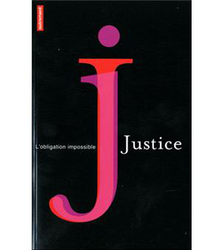
Référence complète : Lebovici, S., C'est pas juste, in Baranès, W. et Frison-Roche, M.-A., La justice. L'obligation impossible, coll. " Nos valeurs", Éditions Autrement, 1994, p. 16-27.
Consulter la présentation générale de l'ouvrage.
Consulter une analyse dans laquelle cet article est cité.
« Les étudiants de Sciences po peuvent lire l’article via le Drive de Sciences po en allant dans le dossier « MAFR – Régulation ».
Compliance and Regulation Law bilingual Dictionnary
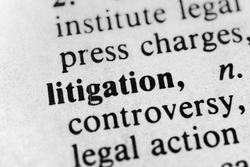
The procedural safeguards enjoyed by a person whose situation may be affected by a future judgment are principally the right to bring proceedings before the court, the rights of the defense and the benefit of the contradictory principle.
The legal action was for a long time considered as a "power", that is to say, a mechanism inserted in the organization of the judicial institution, since it was by this act of seizure, access by which the person enters the judicial machine, through the latter starts up.
But in particular since the work of René Cassin and Henri Motulsky, legal proceedings are considered as a subjective right, that is to say, a prerogative of any person to ask a judge to rule on the claim that the plaintiff articulates in an allegation, that is a story mixing the fact and the law in a building and on which he asks the judge to give an answer, such as the cancellation of an acte, or the award of damages, or the refusal to convict him (because the defense is also the exercise of this right of action).
The legal action is now recognized as a "right of action", the nature of which is independent of the application made to the court, a subjective procedural right which doubles the substantive subjective right (eg the right to reparation) and ensures the effectiveness of the latter but which is autonomous of it. This autonomy and this uniqueness in contrast with the variety of the sort of disputes (civil, criminal or administrative) makes the right of action a pillar of the "Procedural Law" on which a part of European and Constitutional Law are built. In fact, Constitutional Law in Europe is essentially constituted by procedural principles (rights of defense, impartiality, right of action), since the principle of non bis in idem is only an expression of the right of action. Non bis in idem is a prohibition of double judgment for the same fact which does not prohibit a double trigger of the action (and criminal, civil and administrative). This unified due process of Law has helped to diminish the once radical separation between criminal law, administrative law and even civil law, which are clearly separated from one another in the traditional construction of legal systems and which converge today in the Regulatory and Compliance Law.
Moreover, the subjective right of action is a human right and one of the most important. Indeed, it is "the right to the judge" because by its exercise the person obliges a judge to answer him, that is to say to listen to his claim (the contradictory resulting therefore from the exercise of the right of action ).
Thus the right of action appears to be the property of the person, of the litigant, of the "party". This is why the attribution by the law of the power for the Regulators to seize itself, which is understood by reason of the efficiency of the process, poses difficulty from the moment that this constitutes the regulatory body in "judge and party", since the Regulator is in criminal matters regarded as a court, and that the cumulation of the qualification of court and of the quality of party is a consubstantial infringement of the principle of impartiality. In the same way, the obligation that Compliance Law creates for operators to judge themselves obliges them to a similar duplication which poses many procedural difficulties, notably in internal investigations.
There is a classical distinction between public action, which is carried out by the public prosecutor, by which the public prosecutor calls for protection of the general interest and private action by a person or an enterprise, which seeks to satisfy its legitimate private interest. The existence of this legitimate interest is sufficient for the person to exercise his or her procedural right of action.
In the first place, the person could not claim the general interest because he or she was not an agent of the State and organizations such as associations or other non-governmental organizations pursued a collective interest, which could not be confused with the general interest. This procedural principle according to which "no one pleads by prosecutor" is today outdated. Indeed, and for the sake of efficiency, Law admits that persons act in order that the rule of law may apply to subjects who, without such action, would not be accountable. By this procedural use of the theory of incentives, because the one who acts is rewarded while and because he or she serves the general interest, concretizing the rule of law and contributing to produce a disciplinary effect on a sector and powerful operators, procedural law is transformed by the economic analysis of the law. The US mechanism of the class action was imported into France by a recent law of 2014 on "group action" (rather restrictive) but this "collective action" , on the Canadian model, continues not to be accepted in the European Union , Even if the European Commission is working to promote the mechanisms of private enforcement, participating in the same idea.
Secondly, it may happen that the law requires the person not only must have a "legitimate interest in acting" but also must have a special quality to act. This is particularly true of the various corporate officers within the operators. For the sake of efficiency, the legal system tends to distribute new "qualities to act" even though there is not necessarily an interest, for example in the new system of whistleblowers, which can act even there is no apparent interest.
Thesaurus : Doctrine
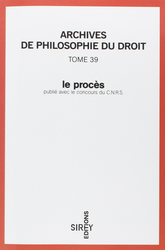
Complete reference : Archives de Philosophie du Droit (APD), Le procès, tome 39, ed. Sirey, 1995, 545 p.
Read the summaries of the articles in English.
See the presentation of other volumes of Archives de Philosophie du Droit.
Thesaurus : Doctrine
► Référence complète : D. Esty et M. Hautereau-Boutonnet, "Derrière les procès climatiques français et américains : des systèmes politique, juridique et judiciaire en opposition", D.2022, p.1606 et s.
____
Thesaurus : Doctrine

► Full Reference: J.-S. Borghetti, "The Relation between Tort Law and Compliance Obligation", in M.-A. Frison-Roche (ed.), Compliance Obligation, Journal of Regulation & Compliance (JoRC) and Bruylant, "Compliance & Regulation" Serie, to be published
____
📘read a general presentation of the book, Compliance Obligation, in which this article is published
____
► Summary of the article (done by the Journal of Regulation & Compliance - JoRC): The Author points out that in order to establish civil liability, it is first necessary to find fault, i.e. a deviation from an obligation, which will trigger a secondary obligation, that of reparation. But it can also be argued that it is from liability that this primary obligation arises, civil liability then revealing an obligation which existed only implicitly. That establishes a two-way relationship between liability and obligation. The Compliance Obligation illustrates this, in particular through the Obligation of Vigilance conceived by the French law of 2017.
The author therefore devotes the first part of his contribution to civil liability as a result of an Compliance Obligation, especially the Obligation of Vigilance. issued of the French law of 2017. After discussing whether the constraints generated by compliance should be classified as 'obligations', since there is no creditor, which therefore opens the way to liability in tort, he examines the conditions for incurring such liability, which are difficult, particularly with regard to the burden of proof and the demonstration of the causal link. The requirement concerning the latter may evolve in French law towards the admission of proportional causality, as is now accepted in certain cases in German case law.
In the second part of his contribution, the author deals with the hypothesis of civil liability as an indicator of a Compliance Obligation. He points out that the claims made, particularly in the cases of TotalOuganda (France) and Milieudefensie v. Shell (Netherlands) seek to obtain from the judge a such "revelation".
The author considers that it is not possible to draw from the French 2017 law which refers to article 1240 of the French Civil Code on the liability because this article is referred to only in order to organise the consequences of a breach of article L.225-102-4 of the French Commercial Code organising the Obligation of Vigilance (article 1240 being therefore under the secondary obligation described above) and not to feed what this article L.225-102-4 requires under the primary obligation (defined above).
On the other hand, the Shell judgment derives directly from civil liability an obligation to act. This is understandable if one takes the perspective and the measure of the future challenges posed, in this case in the area of climate change. But the author considers that it is up to the legislator to decide on such a development in Liability Law.
____
🦉This article is available in full text to those registered for Professor Marie-Anne Frison-Roche's courses
________
Thesaurus : Films
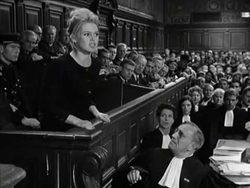
Voir l'extrait du film dans lequel l'avocat plaide l'innocence de sa cliente.
Henri-Georges Cluzot est un cinéaste qui utilise ici Brigitte Bardot, au sommet de sa célébrité, à contre-emploi.
Compliance and Regulation Law bilingual Dictionnary

La présomption est une dispense de preuve lorsqu'elle est établie par la loi. Elle est un raisonnement probatoire lorsqu'elle est présentée devant un juge, raisonnement qui permet d'établir un fait pertinent à partir d'une preuve indirecte. Il constitue en cela un déplacement d'objet de preuve.
On distingue les présomptions légales, lorsque c'est le législateur qui a posé comme établi un fait, ce qui engendre alors non plus un déplacement d'objet de preuve, mais une dispense de preuve pour celui qui doit supporter normalement la charge de preuve.
Lorsque l'adversaire à l'allégation n'est pas autorisé à rapporter la preuve contraire à l'allégation, la présomption est irréfragable. Parce que la présomption irréfragable est une dispense définitive de preuve, elle soustrait la réalité d'un fait à l'obligation d'être prouvé. La présomption équivaut alors à une fiction. Parce qu'il s'agit d'un artefact, on affirme généralement que seul le législateur a le droit de poser des présomptions irréfragables. Ainsi, la présomption de vérité qui s'attache à la chose définitivement jugée est une présomption légale irréfragable. Celle-ci est alors une pure règle de fond, ici l'incontestabilité des décisions de justice contre lesquelles il n'existe plus de voies de recours d'annulation disponible.
A côté des présomptions légales, existent les "présomptions du fait de l'homme", expression traditionnelle pour désigner les raisonnements probatoires précités que les parties présentent au juge. Comme il s'agit de preuves véritables, ayant donc pour objet de reconstituer la vérité, elles ne peuvent pas être irréfragables, et ne peuvent entraîner qu'une alternance des charges de preuve, au détriment du défendeur à l'allégation. La présomption du fait de l'homme est toujours simple.
Si la jurisprudence établit pourtant des présomptions qu'elle pose comme incontestables, cela signifie simplement qu'elle a établie comme une règle de fond, comme la responsabilité des parents du fait des enfants, antérieurement une responsabilité pour faute présumée aujourd'hui une responsabilité aujourd'hui. Cela n'est que l'expression de la jurisprudence source de droit, c'est-à-dire de la jurisprudence au même niveau que le législateur.
____
Exemple concret
Une personne, A, est retrouvée blessée sur la chaussée. Elle prétend que l'auteur du dommage est le propriétaire d'un vélo qui a freiné brutalement et l'a renversée avant de prendre la fuite. Il n'y a pas de témoin. Elle soutient qu'il s'agit de son voisin, B, dont le vélo, est endommagé. Elle démontre qu'il existe sur le bitume des traces de peinture et de pneus, qui correspondent aux entailles du vélo de B., observation faite qu'il a changé ses pneus le lendemain même de l'accident.
A soutient le raisonnement suivant au juge : je dois démontrer que B m'a renversée (objet direct de preuve), ce que je ne peux faire directement. Mais je peux prouver que son vélo est endommagé, qu'il a changé les pneus, que les entailles du vélo correspondent aux traces relevées sur le sol où a eu lieu l'accident, que B a changé ses pneus le lendemain même de l'accident : on peut, par ces preuves indirectes, présume un lien de causalité. Ainsi, la preuve est apportée non directement, mais par raisonnement.
Si le juge admet le raisonnement, comme la présomption n'est pas irréfragable, la question probatoire ne sera pas réglée, il opérera simplement un renversement de charge de preuve. B, défendeur à l'allégation, sera recevable à démontrer que ces éléments, le changement des pneus, l'endommagement de l'ossature du vélo, ont d'autre chose. S'il apporte ces preuves, alors il aura brisé la présomption simple, et le demandeur, qui supporte le risque de preuve, aura perdu le procès. S'il ne les apporte pas, alors le demandeur, grâce à la présomption, aura gagné son procès.
_______

Organization of scientific events
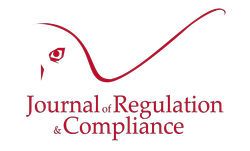
► Full reference : M.-A. Frison-Roche, Scientific coprdination and co-hosting of the colloquia series Compliance and Contract, organised on the initiative of the Journal of Regulation & Compliance (JoRC) and its academic partners
____
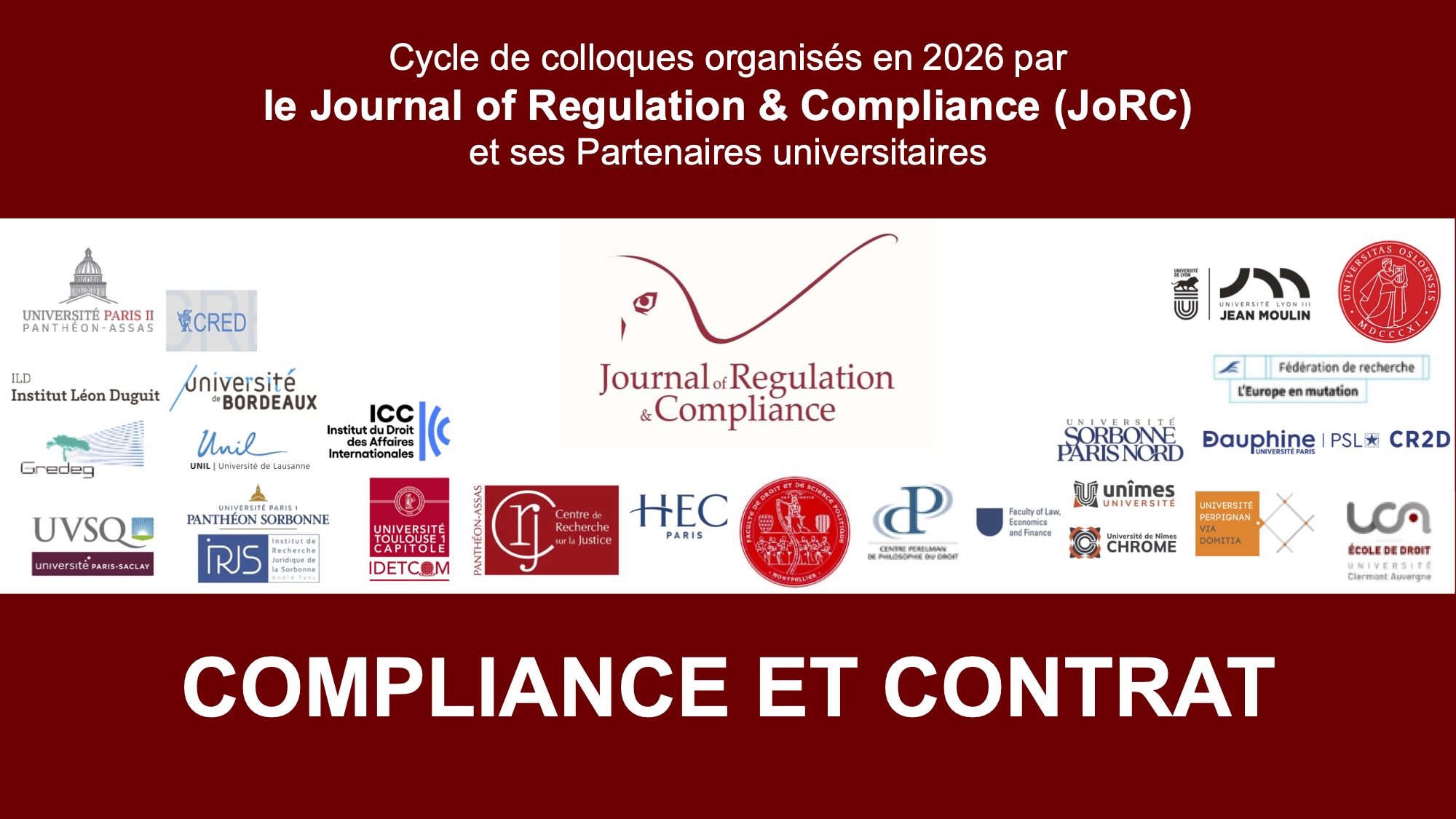
____
► The Symposium Series in a nutshell : As a direct continuation of the previous symposium series co-organised by the Journal of Regulation & Compliance and its partner universities on "Compliance Obligation", which served as the basis for the publication of the book 📘Compliance Obligation, The series, some elements of which began in 2024 and others are already present in this book, explored in depth the specific theme of the links between compliance law and contracts. Indeed, compliance law is often analysed as the construction of laws and regulations to achieve "📘 Monumental Goals " of a political nature desired by States and public authorities, to the achievement of which systemic economic operations contribute through 📘Compliance Tools that are now well documented. Contracts are still relatively little studied, or even developed, in compliance systems that are often perceived through the orders issued, the technologies put in place and the 📘sanctions to be avoided or endured. On the contrary, the future of compliance law, particularly in its European conception, which places human beings at the centre of concerns for the sustainability of systems and the use of contracts, is the new conception that we must adopt. Contracts then appear to be both the means by which the subject company fulfils its legal obligations, forges relationships with other actors and deploys the necessary innovations. Contract law is both used and renewed as a result. The series of symposiums will examine various aspects of this general issue. It will result in the publication of a 📘book Compliance and Contrat.
____
► Presentation of symposiums in development :
- March 2026: COMPLIANCE AND SOCIAL CONTRACT: read the presentation
- 24 April 2026🧮COMPLIANCE: CLAUSE BY CLAUSE: read the presentation
- 29 May 2026🧮THE JUDGE CONFRONTED WITH CONTRACTS OF COMPLIANCE AND COMPLIANCE CLAUSES: read the presentation
- June 2026🧮COMPLIANCE AND COMMON CONTRACT LAW : read the presentation
- 12 June 2026🧮THE "CONTRACT OF COMPLIANCE" : read the presentation
- September 2026🧮COMPLIANCE, VALUE CHAINS AND CONTRACT: read the presentation
________
Thesaurus : Doctrine
► Référence complète : B. Frydman, "Comme l'IA transforme le droit et la justice", in Formes de l'intelligence, Collège de France, 16 octobre 2025
____
► Voir le colloque Formes de l'intelligence, dans lequel la conférence s'insère.
____
____
►Résumé par l'auteur : "Les techniques d’IA ont été introduites depuis longtemps dans le domaine du gouvernement et de la régulation, et se déploient désormais à grande vitesse dans toutes les branches du droit en transformant considérablement les outils et la logique de l’action administrative et judiciaire. Ce développement s’inscrit dans le projet formulé déjà par Leibniz au XVIIe siècle d’un droit mathématisé et calculable, mais recourt à des techniques, comme le profilage, qui trouvent leur source première dans l’usage normatif des probabilités au XIXe siècle. Leur déploiement à large échelle, souvent de manière prématurée et sans contrôle adéquat, met au défi les bases de l’État de droit, spécialement le contrôle des pouvoirs, la protection des droits et la motivation des décisions qui les affectent. En dépit de plusieurs catastrophes d’ampleur industrielle déjà causées par les erreurs qu’elles ont provoquées, ces innovations s’inscrivent dans un modèle de régulation qui est là pour durer et qui nécessite la mise en place de contre-feux et de garanties adaptées qui reposent également sur l’innovation technologique."
____
►Notes prises : Soulignant que la population est de plus en plus favorable à ce que les I.A. gouvernent et jugent à la place des êtres humains, l'orateur insiste sur le fait que le modèle auquel on se réfère est le modèle scientifique. Le gouvernement n'est plus adossé sur la légitimité politique mais sur la formalisation "scientifique". L'IA est le prolongement de cela et notamment Grotius demande un Droit laïc reposant sur la force de la Raison euclidienne reprise par le Droit à travers le syllogisme. Domat poursuit en mettant les lois dans leur "ordre naturel".
C'est surtout Leibniz qui revendique le caractère scientifiquement incontestable du droit et de son application, pouvant se passer de l'approximation des juges et des avocat. Cette conception est aujourd'hui reprise. L'analyse économique du droit, concevant celui-ci comme un mode de gestion de la société, reprend l'idée (Coase).
L'histoire de l'IA est construite de la même façon, tout d'abord en matière de "conforme / non-conforme", puis en profilage des personnages (pour détecter notamment les fraudes, avec des cas préoccupants d'erreurs). Or, on ne connait pas les critères de qualification utilisés par l'IA.
L'orateur proteste car l'IA connexionniste qui choisit la décision ne révéle pas la façon de choisir la décision. Or, c'est une autre IA qui motivera la décision. Et c'est encore une autre IA, agentique, qui mettra en oeuvre.
La Loi a interdit les décisions automatiques : loi 1978, RGPD (mais exceptions possibles et c'est de fait autorisé dans le privé et par des lois spécialtes cela est possible dans l'Etat si justifié), IA (exceptions pour le crédit social, IA à haut risque sont autorisés mais il faut des garanties).
________
Compliance and Regulation Law bilingual Dictionnary
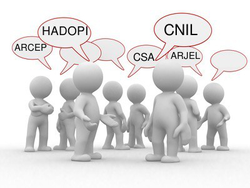
The Independent Administrative Authority (IAA) is the legal form that the legislator has most often chosen to build regulatory authorities. The IAA is only its legal form, but French law has attached great importance to it, following the often formalistic tradition of public law. They are thus independent administrative authorities, especially in the legal systems of continental law like France, Germany or Italy.
The essential element is in the last adjective: the "independent" character of the organism. This means that this organ, which is only administrative so has a vocation to be placed in the executive hierarchy, does not obey the Government. In this, regulators have often been presented as free electrons, which posed the problem of their legitimacy, since they could no longer draw upstream in the legitimacy of the Government. This independence also poses the difficulty of their responsibility, the responsibility of the State for their actions, and the accountability of their use of their powers. Moreover, the independence of regulators is sometimes questioned if it is the government that retains the power to appoint the leaders of the regulatory authority. Finally, the budgetary autonomy of the regulator is crucial to ensure its independence, although the authorities having the privilege of benefiting from a budget - which is not included in the LOLF - are very few in number. They are no longer referred to as "independent administrative authorities" but as "Independent Public Authorities", the legislator making a distinction between the two (French Law of 20 January 2017).
The second point concerns the second adjective: that it is an "administrative" body. This corresponds to the traditional idea that regulation is the mechanism by which the State intervenes in the economy, in the image of a kind of deconcentration of ministries, in the Scandinavian model of the agency. If we allow ourselves to be enclosed in this vocabulary, we conclude that this administrative body makes an administrative decision which is the subject of an appeal before a judge. Thus, in the first place, this would be a first instance appeal and not a judgment since the administrative authority is not a court. Secondly, the natural judge of the appeal should be the administrative judge since it is an administrative decision issued by an administrative authority. But in France the Ordinance of 1 December 1986 sur la concurrence et la libéralisation des prix (on competition and price liberalization), because it intended precisely to break the idea of an administered economy in order to impose price freedom on the idea of economic liberalism, required that attacks against the decisions of economic regulators taking the form of IAA are brought before the Court of Appeal of Paris, judicial jurisdiction. Some great authors were even able to conclude that the Paris Court of Appeal had become an administrative court. But today the procedural system has become extremely complex, because according to the IAA and according to the different kinds of decisions adopted, they are subject to an appeal either to the Court of Appeal of Paris or to the Conseil d'État (Council of State) . If one observes the successive laws that modify the system, one finds that after this great position of principle of 1986, the administrative judge gradually takes again its place in the system, in particular in the financial regulation. Is it logical to conclude that we are returning to a spirit of regulation defined as an administrative police and an economy administered by the State?
Finally, the third term is the name itself: "authority". It means in the first place an entity whose power holds before in its "authority". But it marks that it is not a jurisdiction, that it takes unilateral decisions. It was without counting the European Court of Human Rights (ECHR) and the judicial judge! Indeed, Article 6§1 of the European Convention on Human Rights states that everyone has the right to an impartial tribunal in civil and criminal matters. The notion of "criminal matter" does not coincide with the formal traditional concept of criminal law but refers to the broad and concrete factual concept of repression. Thus, by a reasoning which goes backwards, an organization, whatever the qualification that a State has formally conferred on it, which has an activity of repression, acts "in criminal matters". From this alone, in the European sense, it is a "tribunal". This automatically triggers a series of fundamental procedural guarantees for the benefit of the person who is likely to be the subject of a decision on his part. In France, a series of jurisprudence, both of the Cour de cassation (Court of Cassation), the Conseil d'État (Council of State) or the Conseil constitutionnel (Constitutional Council) has confirmed this juridictionnalization of the AAI.
Thesaurus : Doctrine
►Référence complète : Galli, M., Une justice pénale propre aux personnes morales : Réflexions sur la convention judiciaire d'intérêt public , Revue de Sciences Criminelle, 2018, pp. 359-385.
____
Thesaurus : Doctrine
► Référence complète : Association des professionnels du contentieux économique et financier (APCEF), La réparation du préjudice économique et financier par les juridictions pénales, 2019.
____
________